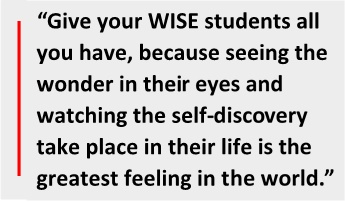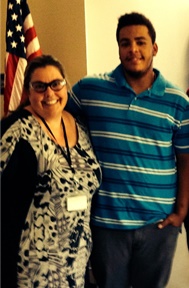Ritamary Montano-Vining, a teacher in the Hunter-Tannersville Central School District, has been mentoring WISE students for 11 years.
“Being a WISE mentor requires a lot of time, energy, commitment,” says Ritamary. “You need to be a mentor for all of the right reasons. If you want to make a difference in the lives of students, there is no better way to do that than by being a mentor. But be prepared. Don’t cut corners. Give your WISE students all you have, because seeing the wonder in their eyes and watching the self-discovery take place in their life is the greatest feeling in the world.”
A Pinnacle in Your Teaching Career
“Taking the time to find out what WISE is all about” is the best way to prepare yourself to be a mentor. “You have to believe in the power of the program. Once you believe in WISE, you can take the next step and get involved in what will prove to be a pinnacle in your teaching career. Being involved with WISE has been one of my greatest achievements,” says Ritamary.
career. Being involved with WISE has been one of my greatest achievements,” says Ritamary.
Ritamary recently sat down with WISE Program Consultants Andy Lutz and Susan Fitts-Sibilia to discuss her experience as a mentor.
Q: What is a WISE “mentor”?
A: A WISE mentor is someone who works alongside a student and helps motivate, focus, and question the project that they are engaged in. It is also important for mentors to teach students about the value of networking and building relationships and making connections. Life is truly about whom you know, and anyone who leads you to believe different is pulling the wool over your eyes.
Q: Why did you decide to become a mentor?
A: I fell in love with WISE the moment Thomas Averill brought the program to Hunter-Tannersville. WISE encompasses our mission and our goals as educators. By preparing students for their future, steering them toward professions and careers, WISE enables us to start building students’ career-and-college readiness before they go to college. Because I wanted our students to be successful, I stepped up and helped get the program going.
Q: Share one of your most memorable/proudest moments as a mentor.
A: It was my first years mentoring for the WISE Program. My mentee Charlotte Meigs wanted to do a WISE fundraising project for the Thailand 2004-South East Asia Tsunami (Indian Ocean Earthquake and Tsunami). Her heart was broken after this devastating tragedy, and she was determined to make a difference-she wanted to show that one person could make a difference and contribute to the funds that were being raised. She also wanted to educate society, bringing awareness to that area of the world. She organized and planned a Battle of the Bands that was held at Hunter Mountain on the stage of the first Mountain Jam. This high school student was going to hold a fundraising event on a main stage, not for personal gain, but to raise money for others. Charlotte was the type of student who didn’t have the words “can’t” or “quit” in her vocabulary. She and her classmates worked tirelessly to produce and run the event, which raised over $6,000. Everyone had a blast, and the concert scene at the mountain took off. I believe that Charlotte played a big part in what is now two gigantic music festivals: Mountain Jam is bigger and better than ever, and Hunter Mountain now hosts Country Fest.
Also, I loved when my last WISE student told me, after he finished his project, that he wasn’t sure if he still wanted to own his own garage. He felt that an automechanic career wasn’t the right way to pursue his interest. He decided to focus on a different profession in college. What a great moment it is to see a student figure this out before they head off to college.
Q: Complete the following sentence: The most difficult part of being a mentor is ___.
A: The most difficult part of being a mentor is showing students the importance of being organized and what hard work can and will accomplish. Most high school seniors believe that they can put off work for another day. With WISE, however, the workload is large and needs to be broken down into smaller chunks. As a mentor, my job is to teach my students how to prioritize, how to make lists, how not to put off until tomorrow what can be accomplished today.
Q: Mentoring is often a two-way street. What have you learned from the students you’ve mentored?
A: My students have taught me some of life’s most valuable lessons. Having passion for my work is one of them. Two of the students I had the pleasure of mentoring were interested in teaching—one wanted to be a Speech Pathologist, and the other wanted to be a Math teacher. These two ladies cared about the students they worked with. Their passion and love for the craft showed. They are now both heading into their junior year at college and are pursuing a teaching career. No matter what school they end up teaching in, their love for teaching will make it feel like they won the lottery. They taught me the importance of having passion, of loving what you do.
Q: What separates a good mentor from an extraordinary mentor? List some traits/characteristics of great mentors.
A: Extraordinary mentors eat, sleep and breathe WISE. They think about their WISE students all the time. They are always pointing them towards the next direction. Everyone deserves to have someone in their corner, rooting for them, pushing them to their limits, making every minute count—it is a WISE mentor’s job to do just that.


 Saving...
Saving...